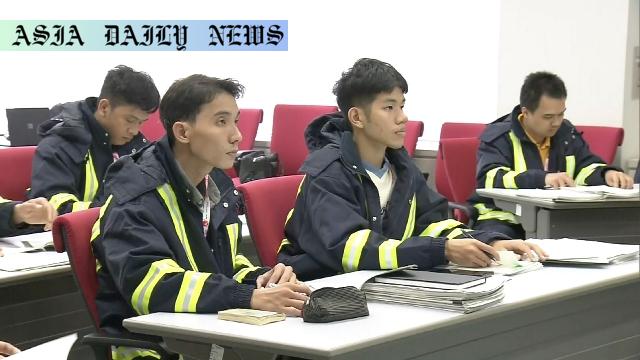Training Program: East Japan Railway Company launches an initial training and employment program for foreign workers to combat labor shortages.
East Japan Railway starts training foreign workers to address labor shortages.
Twenty-five trainees from Indonesia and Vietnam are enrolled in the program.
The initiative includes visa assistance and skill development for railway jobs.
JR East plans to expand the program to train over 100 workers annually by 2025.

Addressing Labor Shortages Through Overseas Workforce Integration
East Japan Railway Company (JR East) has initiated a training program aimed at recruiting foreign workers to mitigate the labor shortages currently impacting the railway industry. Starting in Shirakawa City, Fukushima Prefecture, this inaugural program has enrolled 25 trainees from Indonesia and Vietnam. The endeavor represents a structural adjustment to Japan’s workforce policies, which now include provisions to allow workers with specialized skill sets to gain residence permits.
Participants undergo a comprehensive training regimen designed to prepare them for maintenance roles, such as servicing and managing railway cars. The program includes a detailed overview of railway operations and hands-on training using life-size models of train cars and tracks. This initiative marks a significant step in addressing the critical human resource challenges within the railway sector while fostering a more diverse and skilled workforce.
Program Insight and Future Expansion
Spanning over a month, the training process emphasizes the acquisition of essential technical skills and familiarity with Japan’s high standards of railway management. The ultimate goal is to help successful trainees secure visas and transition into full-time roles with JR East and its partners by this summer. According to a 24-year-old trainee from Vietnam, the experience not only equips participants with valuable engineering skills but also fosters knowledge that can be applied to enhance railway systems in their home countries.
This program signals JR East’s commitment to long-term workforce solutions. Starting in fiscal 2025, the company aims to scale this initiative to train around 100 personnel annually, including workers for third-party railway companies. Such forward-thinking strategies complement concurrent moves toward mechanization and labor-saving measures to sustain the industry.
A Broader Perspective on Workforce Sustainability
The innovative training program underscores JR East’s acknowledgment of the complex challenges facing the railway industry. In an effort to strike a balance between workforce sustainability and technological advancements, officials like Sakaguchi Naoyuki emphasize the importance of addressing labor shortages through a multi-pronged strategy. These include recruitment, skill training, and boosting efficiency via mechanization.
By integrating foreign workers into their ranks, JR East aims not only to alleviate immediate staffing challenges but also to pave the way for a more globally oriented and resilient workforce structure. The initiative aligns with broader governmental efforts to diversify the labor market and adapt to ever-changing economic and demographic landscapes.
This proactive approach, while focused on addressing local labor constraints, also creates ripple effects beyond Japan. It emboldens international trainees with the tools and expertise needed to revolutionize railway infrastructure in their respective countries. This exchange of skills and ideas fosters goodwill and nurtures economic collaboration across borders.
Conclusion
JR East’s training program is a hopeful beacon for the railway industry, showing how collaboration and innovation can effectively tackle systemic challenges. From addressing labor shortages to equipping individuals with life-changing skills, this initiative epitomizes a forward-looking approach to workforce development. As the program expands to include international partnerships and trains more personnel in the coming years, it is certain to leave a lasting impact on both local and global scales.
Commentary
Innovative Solutions to Workforce Challenges
JR East’s initiative to recruit and train foreign workers for the railway industry is commendable, not only for addressing labor shortages but also for fostering international cooperation. In an era where workforce challenges are becoming increasingly global, such programs highlight the potential for inclusive and forward-thinking solutions to shared problems. The decision to target trained personnel from Vietnam and Indonesia aligns well with Japan’s strategic workforce sustainability efforts.
A Model of Collaboration and Skill Development
What sets this program apart is its dual focus on immediate workforce integration and long-term skill development. Trainees not only secure employment through visa facilitation but also gain technical skills that will serve them and their countries in the future. This initiative represents the intersection of economic pragmatism and humanitarian goodwill, fostering a sense of global collaboration.
Looking Ahead
Moving forward, the plan to expand the program to accommodate up to 100 foreign trainees annually by 2025 is ambitious but vital. It serves as a model for other industries grappling with similar challenges. By addressing demographic shifts and labor constraints, JR East is not just solving its own problems but inspiring other sectors to think beyond borders.
Overall, this program is a shining example of how economic and social policies can intersect harmoniously to create lasting benefits for both individuals and industries. The railway systems of Japan and beyond are likely to reap the rewards of this innovative program, reinforcing the value of collaboration and diversity in workforce solutions.


